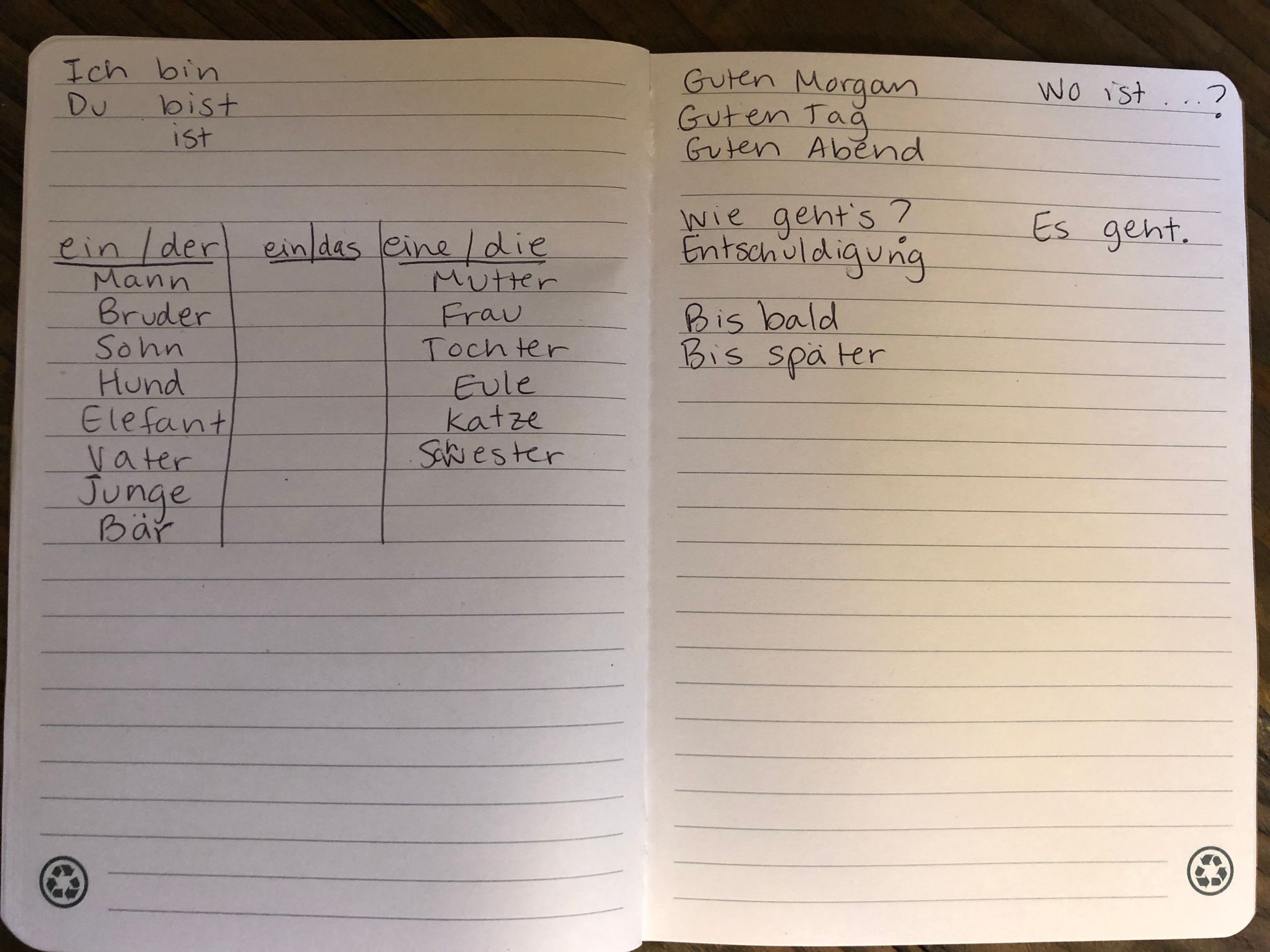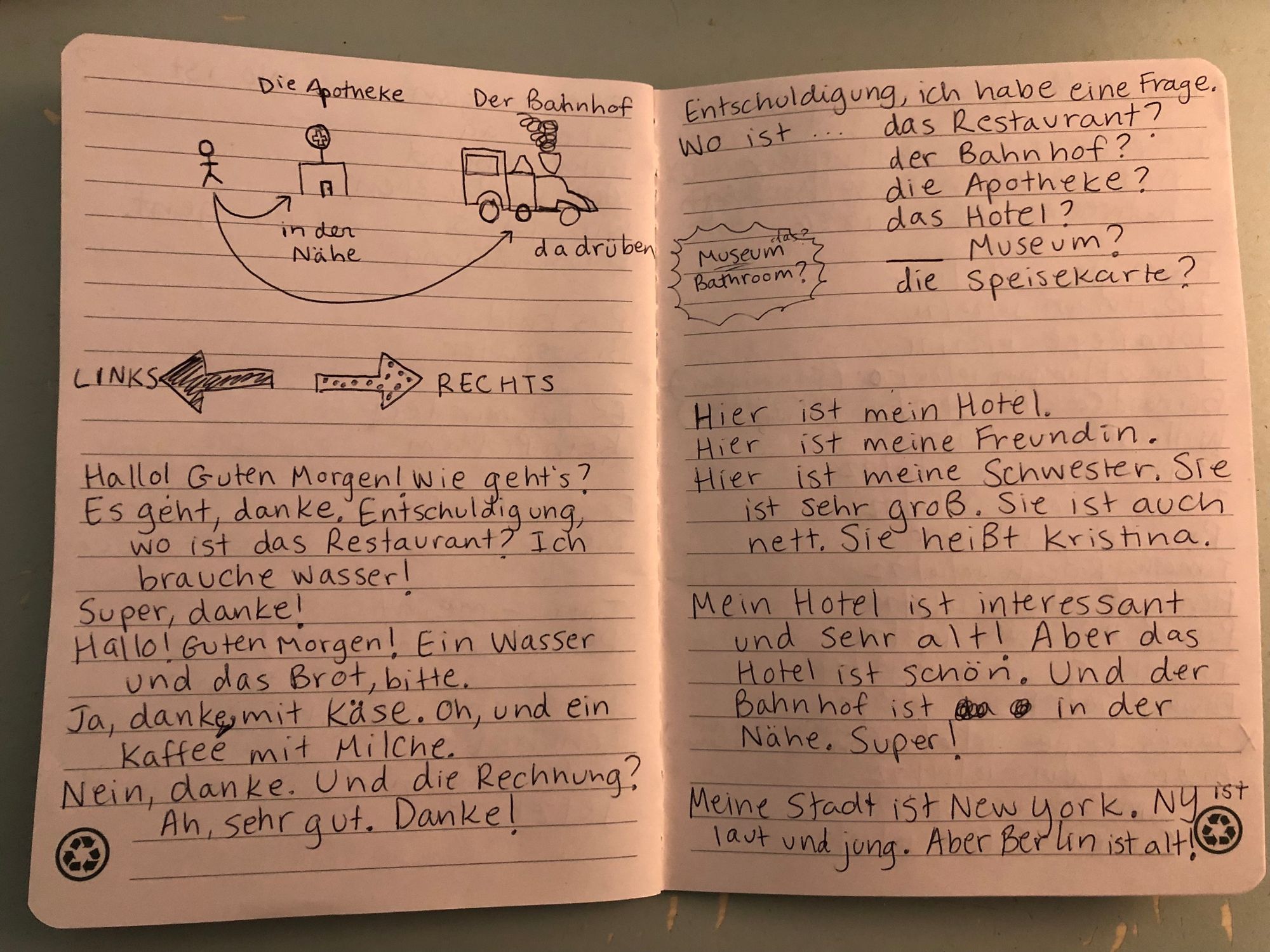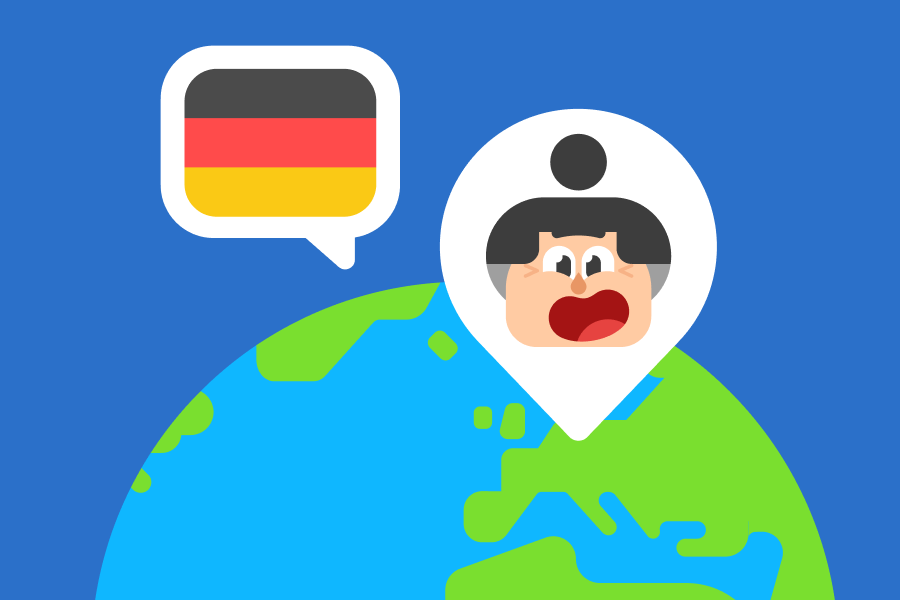Earlier this year, I planned a trip to Italy and studied Italian for 4 months to prepare. It was great! I had lots of meaningful conversations, confidently navigated cities and towns in the countryside, and successfully ordered what I intended, every single time. 💯
But this time was different: I made plans to go to Germany for work, which was exciting except… I didn’t know any German! I've never studied it, everything I know comes from "99 Luftballons," and when I went to Germany in 2008 (pre-Duolingo days), I learned the word for "once" and mistakenly used it in coffee shops across Berlin (einmal croissant, einmal coffee, "once croissant, once coffee"). Ack. 🎈
This time, I used Duolingo to prepare—and I only have 4 weeks! Here's how I prepared for my trip and how it went. Maybe it'll give you ideas of how to prepare for your own trip, especially if you only have a few weeks!
Learning German for travel:
- Setting goals for myself
- 4-week study guide
- How I studied
- What I learned in 4 weeks
- Unpacking: Was 4 weeks enough?
Setting goals for myself
Setting clear goals was important for staying motivated and keeping my learning on track, and it helped me be realistic about what I could accomplish in just 4 weeks. After a month, I was still going to be a beginner—definitely at the A1 level in the international language proficiency scale we use at Duolingo (the CEFR)—so here were my specific, personal language-learning goals for German:
- Be able to greet and be pleasant to German speakers. I wanted to feel comfortable saying hello, good morning, thanks, you're welcome, see you later, asking basic questions, etc. I hoped to avoid the stereotype of the typical American who travels abroad and doesn't know a single word of the language!
- Be able to recognize information, especially on menus and schedules. I pictured having a quiet breakfast and coffee alone, and also wanted to visit a museum or two, so I wanted to understand what I'm ordering when friends and colleagues weren’t around to help, order it successfully, and buy the appropriate tickets for tours or at museums.
- ⚠️STRETCH GOAL ⚠️ Have one small conversation in German. My reach goal was to have a short exchange in German—whether it was explaining where I'm from and why I'm in Germany, or a rave review of a meal (I was very excited about German bread!!), or being able to tell hotel staff about something I need. This was a wildcard! But wouldn't one real conversation be cool?
I could see that Unit 1 ("Order in a cafe, describe your family") is shorter than the others, and I know that Duolingo scaffolds lessons, so they'll gradually build on each other. I planned to work on regular lessons, the Stories that are mixed into the path, Legendary Levels, and the Practice Hub. I also resolved to mix up my practice with new side quests—these are lessons that you complete to earn stars under the Duolingo characters playing on either side of the path. They're timed, so they are a fun challenge, and they review material from the regular lessons.
I only had four weeks, so I focused on only what I needed to accomplish my goals. I consulted the titles and guidebooks at the top of each Unit to see what would be covered, so my goal was to get through Unit 7.
My 4-week study guide
I followed the same rhythm for the whole four weeks: each day, I completed about two circles of the path (does that make them pebbles?), plus a little extra (like Legendary Levels or side quests), so that I completed about two Units a week. Here's a detailed look at my Week 1, followed by my 4-week plan:
Week 1
| Day | Plan |
|---|---|
| Day 1 | Complete three circles ("pebbles") |
| Day 2 | Complete Unit 1 + one side quest |
| Day 3 | Complete half of Unit 2 |
| Day 4 | Complete Unit 2 + start taking notes |
| Day 5 | Do a mix of Legendary Levels, Practice Hub, and side quests |
| Day 6 | Complete half of Unit 3 + a few side quests |
| Day 7 | Complete Unit 3 + a few side quests + update notes |
4 week study plan
| Week | Plan |
|---|---|
| Week 1 | Complete Unit 1, Unit 2, and Unit 3 |
| Week 2 | Complete Unit 4 and Unit 5 |
| Week 3 | Complete Unit 6 and half of Unit 7 |
| Week 4 | Complete Unit 7, start Unit 8, fly to Germany! |
How I studied
Since I didn't have much time before my trip, I was pretty serious about my study routine. It helped that many other parts of my day were focused on Germany, too, like my tasks at work and figuring out what to pack (for me: long underwear).
| Speaking practice | Using the microphone | Important vocabulary |
|---|---|---|
 |
 |
 |
Here's how I studied:
- I focused on my lessons. When I was studying, I wasn't doing anything else, like listening to music or watching TV. (Two exceptions: once I did lessons quickly on the subway platform to not lose my streak, and on Thanksgiving I did my lessons while watching the oven!) This meant I was really thinking about German and was focused on everything I was seeing in my lessons.
- I spoke—a lot. Since my goals were mostly about speaking, I made sure to speak in all my lessons. I never turned off speaking exercises (...except on the subway platform), I repeated everything out loud, and I used the microphone to speak answers even when I could have typed them.
- I took notes by hand. During the first week, I started keeping track of what I was learning—and what I wanted to remember—in a notebook. I made lists of words from memory, and I categorized them by grammatical gender. I wrote important question phrases (like "Where is ___ ?" and "How are you?") and made little groups of words (like "always," "never," "sometimes," and "often"). I wrote mini dialogues and imagined telling someone about myself. It didn't matter that no one was checking my work or grammar, because there was no way my German was going to be perfect in time for my trip anyway! Plus, making myself remember everything "from scratch" was just what I'd be doing in Germany.
- I saved important words and phrases in screenshots. Whenever I came across an important word (especially if it felt hard to me) or a useful phrase, I took a screenshot so I could easily flip back to it to practice. I used my screenshots when I wanted to add things to my notes, and also as an easy way to remind myself of vocabulary throughout the day. They were also a sneaky reminder whenever I opened my photos app!
- I used German every chance I could. Now, I didn't have tons of chances to practice using my German before I left for my trip… but I used every one of them! 😂 I said Guten Morgen! (Good morning!) to my English-speaking colleagues, I muttered greetings and my breakfast order under my breath while I walked to brunch, and I thanked hotel staff in German when I emailed them with questions.


What I learned in 4 weeks
In just the first week—completing the first three units of the course—I had already learned a lot of the key expressions and building blocks that I used in Germany:
- Vocabulary about food and drinks, like Kaffee (coffee), Brot (bread), and Wasser (water)
- Some words for people and animals, including Schwester (sister), Mann (man, husband), and Katze (cat)
- The most important question for travelers: Wo ist ___? (Where is ___?)
- Combining words like und (and) and oder (or), which were especially helpful for my food orders (always mit Käse, bitte "with cheese, please")
- Grammatical gender categories and basic word order
- A lot of words that will help me interact in conversations, including ja (yes), nein (no), bitte (please), and tschüss (bye)
By the end of Week 1, I could also introduce myself, make simple sentences (Die Katze ist sehr gut! "The cat is very good"—which wasn't even in my lessons, I don't think!), and be polite (I knew I'd need Entschuldigung (excuse me) a lot!).
Here's some of what I learned to do in Units 4-7:
- Talk about where people are from (Ich komme aus Amerika und Frau Heidi Klum kommt aus Deutschland, "I am from the U.S., and Ms. Heidi Klum is from Germany")
- Use formal titles and speak formally to others (I'd need this if I met Frau Klum or Frau Angela Merkel, according to my lessons)
- Discuss some activities and hobbies, conjugate verbs about them (!!), and say how often they happen—which means I can make longer sentences to say it all!
- Describe all kinds of buildings and businesses and where they are located (and I heard those direction words a lot, for where bathrooms were, which train doors would open, and more)
- Count up to 10, which was basically all I needed for a quick trip, since large numbers like prices were usually printed on receipts or displayed on cash registers
So, was 4 weeks enough to learn German?
I wouldn't say I learned the entire German language, but I had a great time with the German I learned! I kept track of what I was able to do in German in a Twitter thread. This was a really fun way to celebrate using the language during my trip, and I love having it as a souvenir to remember not just what I did in Germany, but all the ways I was able to use German!
I also accomplished all my goals: I was able to greet and be pleasant to German speakers, I recognized information all around me (including on menus and train schedules)—and I achieved my stretch goal of having a small conversation! Or, sort of 😅 The conversations I had were very tiny, but my big accomplishment was ordering my breakfast at a German café, in a convincing enough way that staff responded to me in German—far more German than I could understand! 🏆
For my traveling style, I'm much more comfortable having a few months of language study under my belt, like I had for Italy, so I can express myself better, understand people's responses, and put more words togethers. I felt comfortable and confident using what I learned in under a month, and I wonder how my German will be after eight months, next summer! 😉 🇩🇪



